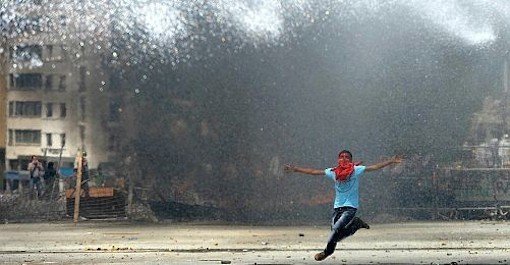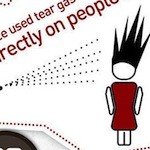Today the odor of the gas does not leave my body. The scent of those who have tried to rot us from within is still on my body; it refuses tofade away. The gas my lungs collected yesterday still does not leave enough space forair.
Colonialism is a regime of lies. It systemically dismembers and subsequently hides truth. The mechanisms behind the production of lies are themselves institutional. In each and every wing of its organization, from its law to its media, from its medicine to its social sciences, from its political figures to its managerial personnel, the capacity to produce lies in a synchronized and harmonious fashion constitutes the foundations of a colonial regime. A colonial regime usurps not only labor and productive resources of a people, but also aims at usurping the very foundations of their truth. Hence, violence, law, and knowledge operate in such seamless harmony. Colonialism is a disaster that continuously poisons and rots bodies and social relations. Only through truth, and nothing but the truth, could one stand up to this disaster. Truth, meanwhile, is only produced through resistance, action, and solidarity. Once faced with the truth of a people who resist, act, and stand in solidarity, the colonial order of things loses its capacity to produce lies.
The game of lies forged yesterday in Taksim Square attempted to dismember the Gezi dissidents, and divide them into two categories: those who are the members of marginal groups and those who are over-excited and misinformed yet innocent youth. The prime minister and the governor warned the innocent and sincere youth against entering the square, and called on them to return to the park, a call which some of them indeed obeyed. In an attempt to discriminate the insurgents from those who are sincerely environmentalists and those who abuse them, the motivation behind this dismemberment effort has been the breaking down of the support of Turkey’s people for the political action at Gezi Park. My words today are about this very topic.
All of the groups labeled as “marginal” by the city governor and the prime minister are legal. Most of thesegroups are in fact leftists and revolutionary organizations. And precisely because they routinely come under attack by the state, harassed in their assemblies and protests, taken under detention without charges, and choked in gas despite being legal and legitimate social organizations, they know state violence well and know even better how to resist it. Those groups labeled as “marginal” have always carried their flags and banners through which they claimed their existence in the squares of Turkey. For example, the Kurdish “Yurtsever” youth have always carried, and still carry, the banners of Abdullah Öcalan, their choice of a leader, demanding his liberation. Another example is the anarchists who carry a black flag and struggle for a society without the imposition of a state. Some revolutionary parties in fact propose to usurp your money and property, and in its place, imagine a world without the imposition of property itself. Although they all operate on legal grounds and subsequently partake in the formation named as the “Taksim Solidarity Platform,” they have been continuously, systemically, and in every space imaginable, rendered as convicts of a gray place. Because they struggle in this gray place in social life, whereby the line between legality and illegality is being blurred by state violence itself, the conventional adjective that comes to mind to label them in Turkey is indeed no other than “marginal.”
For the past fourteen days, Gezi has ceased to be just about Gezi Park itself. Gezi Park has become a revolt against marginalization. The fifty percent vote that the AKP administration has received has not broken with, but rather advanced into a new phase, the one-hundred-year-old politics of “marginalize the ones who do not resemble you” in Turkey. Precisely because the AKP has aimed at marginalizing each and every one of the other fifty percent of Turkey that did not resemble its constituents, that the other fifty percent of Turkey has revolted against it on the grounds of Gezi Park. The majority of those who came to the park on the first day of the Gezi Park revolts have been themselves regular employed folk, who on weekends and after work, and only through the spaces that those “marginal groups” played a critically important role in producing, have sampled a taste of statelessness, and subsequently claimed their city back.
During the day on weekdays, the ones who remained in the area of Gezi Park have been either members of marginal groups, or young men and women. It has been this latter set of individuals who have taken turns watching “the barricades” keeping the police at bay. For many, returning to Gezi Park and leaving the square equals being without any other possibilities in life itself. Precisely because of this equivalence, Gezi Park is not unique; it is simply one odd place in an otherwise uniform Turkey. From the third Bosporus Bridge to the police stations, from the dams to the hydroelectric plants, from urban renewal to forest fires, Gezi Park is but a part of a much large whole. Against the lying media, against ten thousand incarcerated individuals, and against the dirty war in Kurdistan, Gezi Park is a revolt. Of course, it is also a war of dignity—forged by the middle classes who feel their lifestyles are being systematically threatened and their environment ruined. That said, if the marginalized factions of Turkey’s society have filled up a space of dignity initially forged by the middle classes, and subsequently imagined their existence anew in this space, the Gezi Park revolt could not be approached as the stage for an opportunistic politics of “utility,” but rather as one of imagining life and politics anew. Those who have protected the square, have protected this very attempt at a new existence and being-in-the-world. And certainly they will not allow others to delineate the border of this stage as they please.
A twelve-year-old Kurdish teenager who comes to the protest area will certainly throw stones at the police. Of course the revolutionary, choked in gas for years and tortured in Turkish prisons, will march against the police with his flag in his hand. Of course young women and men will form halay and start dancing in front of the police and patronize them. Of course those young men and women, all leaving their dish-washing jobs at restaurants and industrial workshops, will not move an inch away from the barricades after having sampled a different taste of life day after day, night after night, next to those very barricades. It is vital for some dissidents and allies to remember that the Gezi Park demonstrations have never been “innocent” since their very inception fourteen days ago: Gezi Park, quite simply put, has been a popular uprising, a revolt of the people.
The current city governor of Istanbul, Hüseyin Avni Mutlu, has served as an officer of a colonial regime, first in the 1990s as municipal governor in Silopi, then as vice city governor in Şırnak, and in 2000s as a city governor in Siirt and Diyarbakir. It is precisely because the truth about what happened in Turkey in the 1990s has not surfaced until this very day that Governor Mutlu has been able to advance to his current position, and remains capable of infesting a new generation. Those like him know all too well how to lie and how to marginalize others.
Whatever its outcome will be, the Gezi Park resistance has sparked a fight for truth in this country. It should be carried forward in solidarity, and with fortitude and resilience. Get used to banners and flags. Get used to kids out of whose mouths rage ensues. Get used to patronizers and slogans. Today there is an enraged person inside me. I am most enraged about lies. And about those who are deceived by lies. I am determined to resist the taste of poisonous gas that the state has poured into my mouth, while their poisonous “truths” aim to penetrate my conscience. It is high time to do away with the entire vocabulary of “blurry realism,” that has taken over our language, aimed at confusing people, and dismembering the truth about critical situations. Those marginal groups have a slogan: “There is no liberation alone; either all together, or none of us.” This is one of the oldest worldly truths.
* Click here to read the article in Turkish.
* Courtesy of Emrah Yildiz from Jadalliyya for the translation of this article.






sa.jpg)
